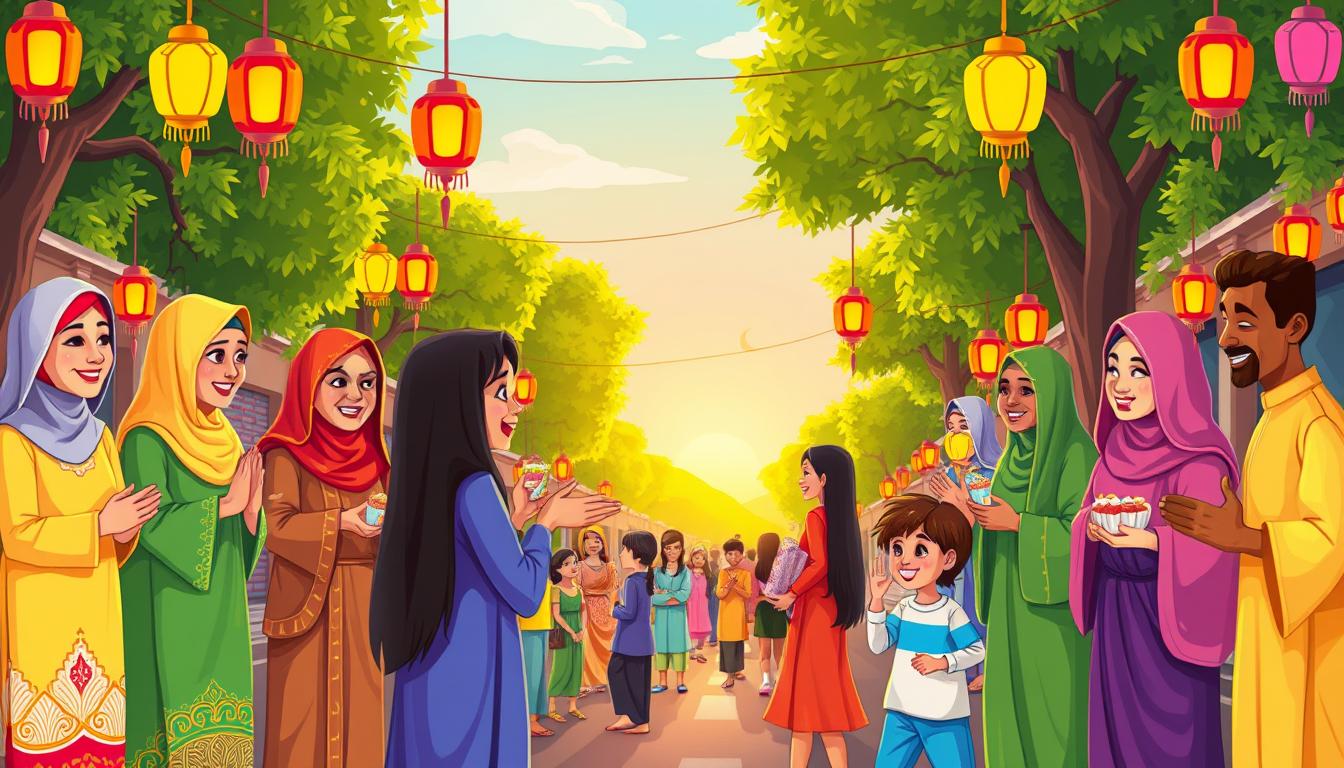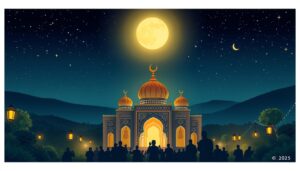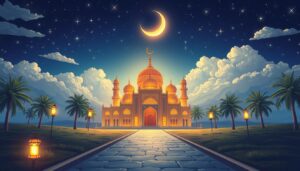About 1.8 billion Muslims will celebrate Eid al-Fitr this year. It marks the end of Ramadan. Umar Khan Charity Organization wishes you a blessed Eid ul Fitr 2025. We invite you to join us in making a difference through faith-based humanitarian work.
We aim to spread hope, empowerment, and positive change. As Eid ul Fitr 2025 approaches, we highlight the role of Islamic charitable work. It’s important in our community during these celebrations.
Key Takeaways
- Eid ul Fitr 2025 is expected to be celebrated on Sunday, March 30, 2025, or Monday, March 31, 2025.
- Approximately 1.8 billion Muslims worldwide will celebrate Eid al-Fitr.
- Eid ul Fitr marks the end of Ramadan, which typically lasts 29-30 days.
- Zakat al-Fitr is obligatory for all Muslims and must be paid before the Eid Prayer.
- We at Umar Khan Charity Organization focus on Islamic charitable work and Eid ul Fitr celebrations to transform lives.
- Eid ul Fitr celebrations include traditional foods, festive meals, and generosity, such as giving money as gifts to children.
- Participation in public Eid ul Fitr celebrations may vary by country, with some countries having school and business closures.
Understanding Eid ul Fitr 2025
As Ramadan approaches, we wish you a fruitful fasting period and a joyful Eid ul Fitr. The Eid ul Fitr date varies by region due to moon sighting differences.
The Islamic calendar and regional variations lead to different celebration dates worldwide. Here are some important points to keep in mind:
- Eid al-Fitr in 2025 is expected to be celebrated on Sunday, March 30, or Monday, March 31, depending on the moon sighting.
- The Islamic lunar year is about 10-11 days shorter than the Gregorian solar year. This means Eid al-Fitr moves back each year.
- Zakat al-Fitr, or obligatory charity, is traditionally one Sa’ (about 2.25-2.5 kg) of staple food, such as dates or barley, or its monetary equivalent.
As we prepare for Eid ul Fitr 2025, it’s key to know the basics of this important celebration. This includes its expected date and the moon sighting process. By staying informed, we can have a unified and meaningful celebration with our families and communities.
The Historical Journey of Eid ul Fitr
We gather to explore the history of Eid ul Fitr and its importance in Islam. Prophet Muhammad started Eid ul Fitr as a joyous day after Ramadan. It ends fasting and starts a new month in the Islamic calendar.
Looking into the history of Eid ul Fitr, we see it as a time for thanks, forgiveness, and coming together. Knowing its history deepens our understanding of this festival. It helps us grow closer in faith and unity. Islamic festivals like Eid ul Fitr are key in building community and spiritual growth.
Some important parts of Eid ul Fitr include:
- Celebrations last one to three days, based on the lunar calendar and local customs.
- Exchanging gifts, called Eidi or Eidiya, is a favorite among kids during Eid.
- Group prayers and feasts are key, bringing people together and creating a sense of community.
Reflecting on the history of Eid ul Fitr and its role in Islam, we remember the value of thanks, forgiveness, and unity. By embracing the values and traditions of Islamic festivals like Eid ul Fitr, we can strengthen our faith and foster community.
Spiritual Significance in Islam
Eid ul Fitr is deeply connected to Ramadan, a month of fasting and reflection. Ramadan reflections help us prepare for Eid ul Fitr. They focus on our spiritual growth and faith connection.
The Spiritual significance of Eid ul Fitr marks the end of Ramadan and the start of a new spiritual journey. It’s a time for reflection, gratitude, and seeking forgiveness. This rejuvenates our spirits and strengthens our community bond.
Connection to Ramadan
Ramadan is a key part of the Islamic calendar, closely tied to Eid ul Fitr. Fasting in Ramadan is one of Islam’s Five Pillars, showing its importance. As we fast, we prepare for Eid ul Fitr, embracing values like compassion and unity.
Religious Obligations
Knowing Eid ul Fitr’s religious duties is vital. Zakat al-Fitr, a charity, is a major part, showing the importance of giving. This act helps both the giver and the receiver, strengthening community bonds.
Spiritual Benefits
Eid ul Fitr offers many spiritual benefits. It brings Muslims together, strengthening their faith and bonds. The celebrations, like the Eid prayer and gift-giving, enhance family ties and spread joy. Celebrating Eid ul Fitr reminds us to keep the spiritual gains from Ramadan all year.
Essential Preparations for Eid Day
As Eid ul Fitr gets closer, we start getting ready for the fun. Eid ul Fitr preparations are key to the celebration. They unite the Muslim community. We clean our homes, buy new clothes, and cook traditional foods to share with family and friends.
Muslim community events are a big part of Eid ul Fitr. We gather to pray, eat together, and exchange gifts. These gatherings help us feel connected and part of a community. They’re a wonderful way to bond with others who believe like us.
Some important Eid ul Fitr preparations include:
- Cleaning and decorating our homes
- Buying new clothes and accessories
- Preparing traditional foods, such as vermicelli and sweet dishes
- Attending Eid prayers and community events
By doing these preparations, we make sure our Eid ul Fitr is full of joy and meaning. We hope you have a happy and blessed Eid ul Fitr, filled with love, laughter, and time with your loved ones.
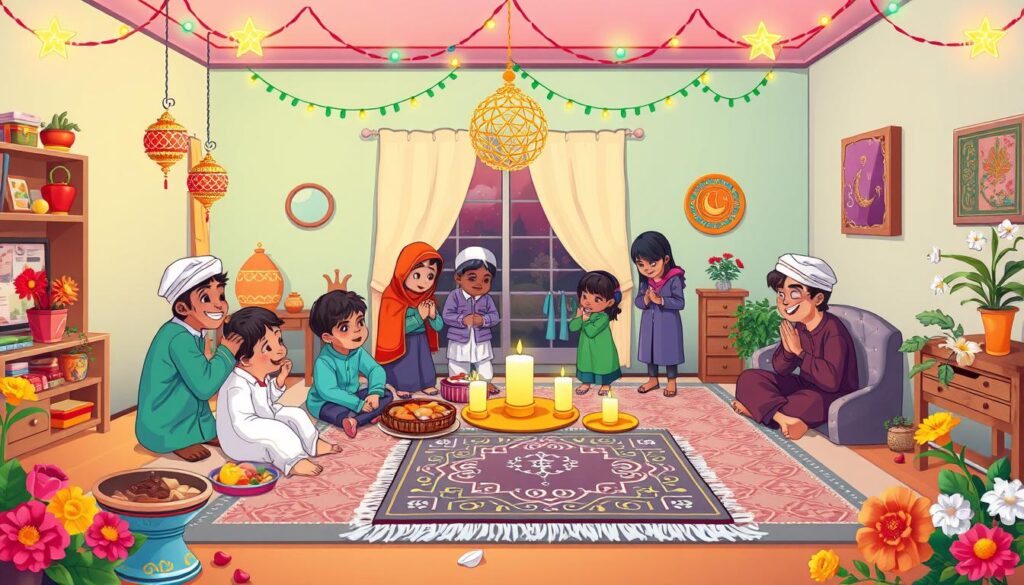
Zakat al-Fitr: Understanding Your Obligations
Zakat al-Fitr is a key part of Eid ul Fitr. It’s a charity we give to the poor before the Eid prayer. It shows our care for the less fortunate and our sense of responsibility and compassion.
As we get ready to give Zakat al-Fitr, it’s important to know how to calculate it and when to pay. In 2025, each person should give about $5. This amount is based on the price of local food, making it affordable for everyone.
Key Aspects of Zakat al-Fitr
- Zakat al-Fitr is for every Muslim, showing we all have a role to play.
- It’s for every Muslim, not just the rich, because it’s based on each person, not their wealth.
- Together, our Zakat al-Fitr helps solve big problems like poverty and hunger worldwide.
May your Zakat al-Fitr help those in need. By giving, we can improve our communities and fight for equality.
The Morning of Eid: Step-by-Step Guide
We wish you a blessed and peaceful morning on Eid ul Fitr. As we prepare for this special day, it’s essential to follow the Eid ul Fitr morning guide. This guide helps us have a meaningful and spiritual experience. The morning starts with a special Islamic prayer, followed by festivities and celebrations.
The guide tells us to wake up early and perform the morning prayer. Then, we head to the Eid prayer location. It’s also recommended to eat something sweet, like dates, before the prayer. Here are some key steps to follow:
- Wake up early and perform the morning prayer
- Eat something sweet, like dates, before the Eid prayer
- Head to the Eid prayer location, preferably walking if feasible
- Listen to the khutbah (sermon) after the Eid prayer
By following the Eid ul Fitr morning guide, we can ensure a spiritual and meaningful experience on this special day. Remember to give Zakat al-Fitr before the Eid prayer. Also, spend time with family and friends, sharing in the joy and festivities of Eid ul Fitr.
Traditional Eid Prayers and Practices
We gather as a community for the Eid ul Fitr prayers, a key part of our celebrations. These prayers are done together, creating a sense of unity. We’ll look into their history, importance, and how they strengthen our faith and bonds.
The Eid prayer, or Salat al-Eid, is special and consists of two rakats. It’s a must for every Muslim, no matter their age or gender. We also encourage Muslims to give Zakat al-Fitr, based on food prices, to help the poor.
Important parts of Eid prayers and practices include:
* Performing the Eid prayer together
* Giving Zakat al-Fitr to help the poor
* Exchanging gifts, or “Eidi,” with loved ones
* Joining in communal celebrations
We hope your Eid prayers are accepted and your wishes granted. May this special time bring us closer to our faith and each other.
Celebrating with Family and Community
As we gather with our loved ones to mark the end of Ramadan, Eid ul Fitr celebrations become a time to strengthen bonds and create lasting memories. We wish you a wonderful time celebrating Eid ul Fitr with your family and community, filled with joy, love, and gratitude.
At the heart of Eid ul Fitr celebrations are family gatherings, which bring people together and foster a sense of belonging. These gatherings often involve traditional foods, decorations, and the exchange of gifts, making the occasion even more special and meaningful.
Some of the ways we can make the most of this special time include:
- Hosting or attending family gatherings and community events
- Preparing traditional foods and drinks to share with loved ones
- Exchanging gifts and stories to strengthen bonds and create new memories
As we come together to celebrate Eid ul Fitr, we are reminded of the importance of community and the value of family gatherings. By embracing these values, we can create a more harmonious and supportive environment for everyone.
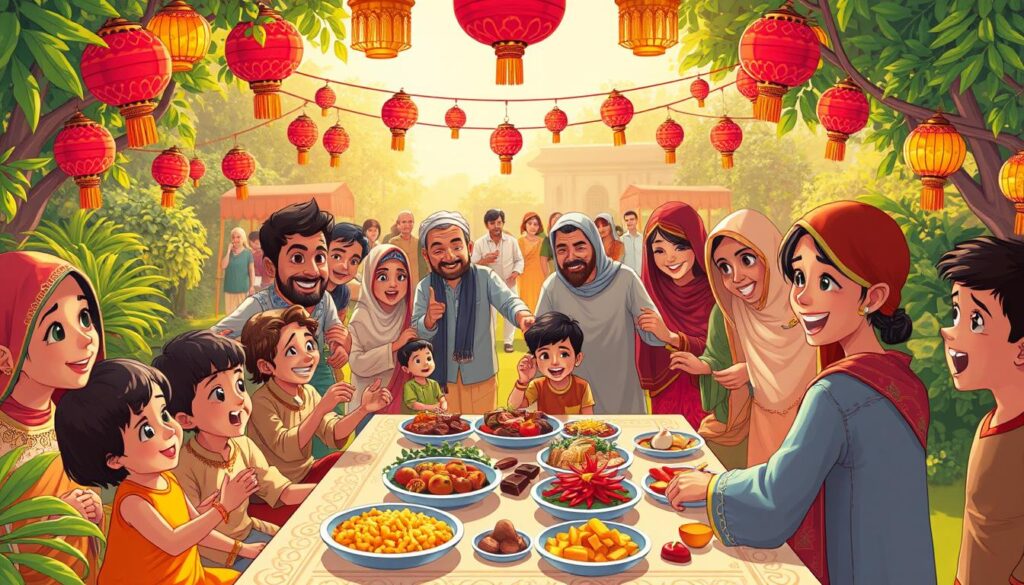
Traditional Foods and Festive Meals
As we come together with family and friends to celebrate Eid ul Fitr, food is a big part of the fun. We enjoy many Eid ul Fitr foods, each with its own special taste and meaning. These dishes show the rich cultural heritage of the Muslim community.
Popular dishes include maamoul, a cookie filled with dates or nuts, and sheer khurma, a sweet vermicelli dessert. We also love traditional dishes like tajine, a slow-cooked stew, and doro wat, an Ethiopian chicken stew. The variety of Eid ul Fitr foods highlights the diversity and richness of the Muslim community.
Here are some traditional recipes you can try this Eid ul Fitr:
- Maamoul: a shortbread-like cookie filled with dates or nuts
- Sheer khurma: a sweet vermicelli dessert
- Tajine: a slow-cooked stew
- Doro wat: an Ethiopian chicken stew
As we celebrate Eid ul Fitr, we remember the role of traditional foods and festive meals. They bring us together. Whether you’re trying new recipes or enjoying old favorites, Eid ul Fitr’s traditional foods are a delicious way to connect with the Muslim community’s rich heritage.
| Traditional Food | Description |
|---|---|
| Maamoul | A shortbread-like cookie filled with dates or nuts |
| Sheer khurma | A sweet vermicelli dessert |
| Tajine | A slow-cooked stew |
| Doro wat | An Ethiopian chicken stew |
Modern Eid Celebrations Around the World
Eid ul Fitr brings a colorful mix of traditions from all over. Each place adds its own special touch to the celebrations. From bright decorations to unique customs, every corner of the globe has its own flair.
Eid ul Fitr shows the rich diversity of cultures. Here are some examples:
- Saudi Arabia and UAE are known for their big public events and traditional dances.
- Indonesia and Malaysia focus on family gatherings and special foods like sheer khurma and baklava.
- Egypt celebrates with holiday cookies called Kahk and a traditional breakfast dish called Fata.
These celebrations show off local traditions and shared values. They highlight the importance of faith, gratitude, and coming together during Eid ul Fitr. Exploring these modern Eid celebrations reminds us of the value of community and the joy of giving.
In Indonesia, the Mudik tradition is a big deal. In Malaysia, Rumah Terbuka open houses are common. Turkey celebrates with a Festival of Sweets. Each event shows the Muslim community’s adaptability and strength. As we gather to end Ramadan, we’re inspired by the diversity and richness of these celebrations. Eid ul Fitr is truly special because of it.
| Country | Cultural Celebration |
|---|---|
| Saudi Arabia | Traditional practices, including early morning prayers and family gatherings |
| Indonesia | Mudik tradition, where people return home for Eid |
| Malaysia | Rumah Terbuka open houses, fostering community and familial relationships |
Making Eid Meaningful for Children
We think it’s key to get kids involved in Eid celebrations. This helps pass on the festival’s values and traditions to the next generation. Celebrating Eid ul Fitr with kids can be a fun and enriching experience. It helps them understand the importance of this special day in Islam.
There are many ways to make Eid meaningful for kids. You can make DIY decorations, cook traditional foods, or do educational activities like making Eid cards. Over 70% of families do these activities to keep traditions alive, even when times are tough. You can also teach kids about generosity by making goodie bags for Eid.
For more on Eid celebrations, check out Eid celebrations for new Muslims.
Here are some ways to engage children in Eid celebrations:
- Creating DIY decorations, such as paper lanterns or moon and star decorations
- Preparing traditional foods, such as sweet dishes and savory meals
- Engaging in educational activities, such as making Eid cards or learning about the history of Eid
- Involving children in the creation of goodie bags for Eid, teaching them the values of generosity and gift-giving
By getting kids involved in these activities, we can help them understand Eid ul Fitr’s significance. We wish you and your family a joyful and educational Eid ul Fitr. May it be filled with meaningful family activities and a stronger faith connection.
Conclusion: Embracing the Spirit of Eid ul Fitr
As we wrap up our exploration of Eid ul Fitr 2025, we see that its spirit goes beyond just one day. This festival celebrates community, gratitude, and spiritual growth. These values are at the heart of the Islamic faith.
The colorful decorations, tasty foods, and happy gatherings are exciting. But it’s the deeper principles that truly make Eid ul Fitr special. These principles make it a celebration full of meaning and depth.
Every day, we can live out the spirit of Eid ul Fitr. We can build stronger community bonds, be thankful for what we have, and grow spiritually. By doing so, we can change our lives and the lives of those around us. We can make the world a kinder and more united place.

